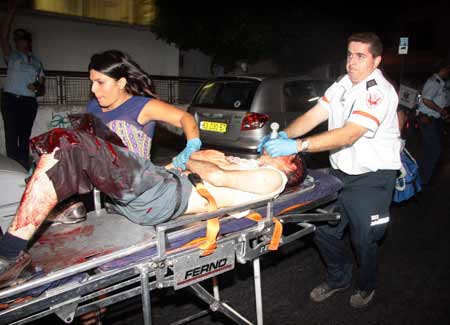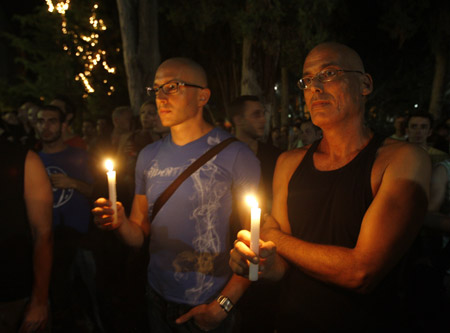By David Harris
Israel's homosexual community was plunged into mourning and fear on Saturday night when a gunman killed two people and wounded around a dozen at a gay and lesbian center in Tel Aviv.
 |
|
An Israeli paramedic rushes a wounded man to an ambulance after a shooting incident in a basement club in central Tel Aviv Aug. 1, 2009. [Xinhua/Reuters Photo] |
While police combed the area to hunt the attacker, hundreds of members of the homosexual community and their supporters held an impromptu vigil on hearing of the shooting.
"Currently most of the responses we are getting from the lesbian, gay, bisexual and transgender communities are calls for action and protests. They are deeply in shock because of these brutal murders, and several spontaneous demonstrations have been held last night and today," said Roy Barak, the chief technical officer of the GoGay Media Group.
Evidence at the scene suggests that this was a targeted attack against the homosexual community, and terrorism has been ruled out, said the police, while stressing that it was impossible to predict the fatal incident.
"There is no specific protection for the gay community, unless there are any warnings that we receive on an intelligence level and then all the necessary steps are taken," said police spokesman Micky Rosenfeld.
This incident is the latest and worst in a series of attacks on homosexuals in Israel. The last one in recent memory occurred in 2005, when religious Jewish protestors tried to prevent a gay pride parade in Jerusalem, and despite heavy police presence, one demonstrator stabbed two of the marchers.
 |
|
Israelis take part in a candlelight vigil for the victims of a shooting incident at a basement club in central Tel Aviv Aug. 2, 2009. [Xinhua/Reuters Photo] |
Across the Middle East, where homosexuality is often regarded as a taboo or even a perversion in religious nations, the Jewish state enjoys one of the most open societies.
Gays and lesbians can have common-law marriages and can serve openly in the army and in the parliament. Festive gay parades are held annually in some local cities.
However, the struggle of Israeli homosexuals for equality and respect is still a rocky road. Ultra-Orthodox Jews often demonstrate against homosexuality, and some lawmakers from religious parties have even compared it to drug addiction.
"These people are dangerous and we must keep an eye on them ... We must set up special teams of psychologists, psychiatrists and social workers who will help them return to a normal life, just like in a drug rehabilitation center," local news portal Ynet quoted lawmaker Nissim Ze'ev of the Shas party as saying in 2007.
Noting that "there was a general feeling that things were okay" with the homosexual community, Avner Dafni, director of the Israeli Gay Youth Organization, told Xinhua that the latest attack prompted the group to re-evaluate the situation.
 |
|
Israeli paramedics treat victims after a shooting incident in a basement club in central Tel Aviv Aug. 1, 2009. [Xinhua/Reuters Photo] |
"The situation had been improving in recent years. We've been getting more representation in politics and the media," said Dafni, adding that this is why everyone was stunned by Saturday's murders.
Now lesbian and gay leaders and youth workers are planning damage-control exercises, amid fears that many young homosexuals who have been brave enough to openly declare their sexuality would be too scared to return to gay bars, nightclubs and centers, and that some of them would even go back to living a double life and keep their sexuality a secret.
"It took us many years within the organization to create the sense of security needed at the meeting places for young people around the country ... Today we are hearing from our workers on the ground that people are now simply afraid to go there any more, " said Dafni.
The GoGay website was filled with dozens of reader contributions on Sunday. One from a woman who signed her name as Eman summed up the feelings of many: "I've been a member of this community for 25 years and have come across attacks more than once. Attacks against me and my friends have left indelible physical marks on our bodies ... I keep asking myself, 'where do we go from here?'"
(Xinhua News Agency August 3, 2009)